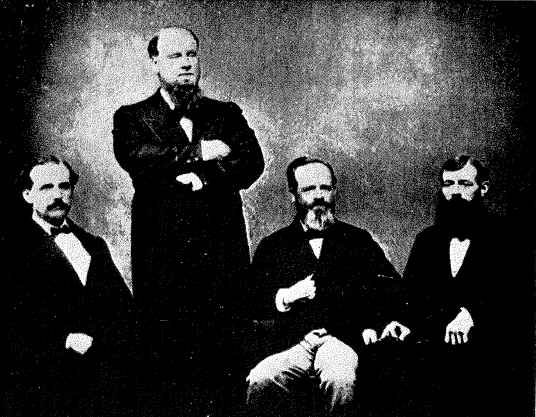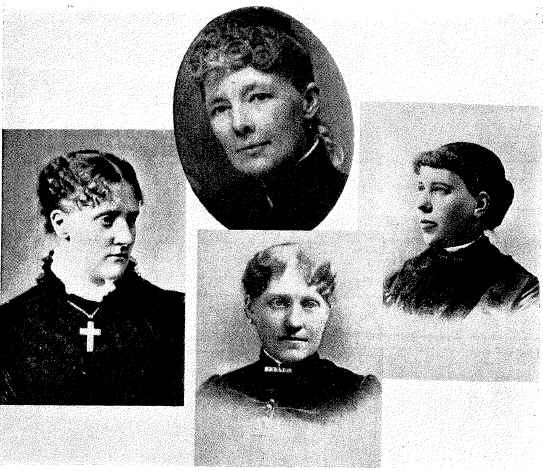Old Stoughton Musical Society
| Home | History | About Us | Join Us | Concerts | Make a Gift | Contact Us | Links |
THE ONE HUNDREDTH ANNIVERSARY
CELEBRATION
By Mrs. Mary Swan Jones
[This story of the celebration of the One Hundredth Anniversary of the
Old Stoughton Musical Society, which was held in Stoughton on June 9th,
1886, marks one of the most outstanding events in the history of the
ancient Society. Large and extensive preparations were made for this
gala event. A special commemorative newspaper was published from the
office of the Stoughton Sentinel, under the management and editorship of
Mr. Edwin Arthur Jones and Lemuel W. Standish. Five
thousand copies of this paper were broadcasted and aided materially in
the splendid success which attended the celebration of this Centennial
event.]
The Stoughton Musical Society, often called the "Grand Club" in the old
records, held a number of rehearsals during the years 1878 and 1879, at
which modern and classical music was used. In 1885 and 1886 they
rehearsed Haydn's Creation for the Centennial Concert, which took place
June 9, 1886, the "Musical Society in Stoughton" assisting. This concert
was largely attended. There were special trains on the Old Colony and
the Providence railroads to accommodate the singers, their families and
friends. Hon. Winslow Battles, the President of the Society, made
the address, welcoming the guests. Mr. Battles was a native of
Stoughton, and lived in Stoughton until he was of age. Some time
afterwards he went to Randolph to live with a married sister, and
remained there until his death. Hon. Samuel B. Noyes, of Canton,
delivered an historical address. President Battles spoke with enthusiasm
of the early members of the Society and their work. The exercises opened
in the morning with Mozart's Magic Flute by an orchestra of forty-eight
pieces, under the direction of Mr. Edwin A. Jones. A hymn
followed, written for the occasion by B. Winslow Packard, of
Brockton, which was sung to the tune of Old Hundred. Mr. Hiram Wilde was
Chorister. Rev. Elmer Capen, of Tufts College, offered prayer.
Mr. Capen is a native and was formerly a resident of Stoughton.
After the address, 'Majesty,' 'Complaint,' 'Victory' and 'Child of
Mortality' were sung, closing with a Centennial Hymn, written for the
Society by Dexter Smith, of Boston, and sung to the tune of
Keller's American Hymn.

Union Quartette (1861)
| Isaac Littlefield, Avon | John B. Thayer, Randolph |
| Horace Willis, Easton | Fred Russell, Easton |
The dinner was spread under a large tent on the village green, beneath
the trees in front of the First Parish Church. There were seats for
about four hundred and thirty people. Rev. John C. Labaree, of the First
Congregational Church, Randolph, asked the divine bless--ing on the
assembly. (Mr. Labaree is a lineal descendant of Mr. Edward Capen, whose
death is mentioned in the records of the Musical Society in Stoughton.
This Mr. Capen was the father of Mr. James Capen, one of the original
twenty-five signers of the first Rules and Regulations of the Stoughton
Musical Society, in 1786; also of Deacon Abram Capen, proprietor of the
Capen House.) The after-dinner speeches were very interesting. Doctor T.
H. Dearing, of Braintree, was master of ceremonies. Rev. Edward K. Alden
of Boston, Hon.
Elijah A. Morse of Canton, Eugene B. Hagar of Boston, Secretary of the
Handel and Haydn Society, Hon. Henry L. Pierce of Milton, a native of
Stoughton, Hon. Samuel B. Noyes of Canton, Rev. Elmer Hewitt Capen, D.
D., President of Tufts College, and Rev. Oliver L. Dean of Holbrook,
addressed the assembled guests. Coronation and the Star Spangled Banner
were sung.
After the ceremonies of dinner were over, the guests, with their
friends, scattered through the village to see old acquaintances and make
new ones. All gathered promptly at the appointed time in the Town Hall
to be in readiness for the evening concert. The stage presented a
brilliant spectacle when Mr. Hiram Wilde, the conductor, stood up in
readiness for the opening chords of Haydn's Creation.
The first notes of the orchestra were like a paean of triumph for these
two societies, and the chorus of three hundred voices pealed forth
joyously in unison.
George D. Robinson, then Governor of Massachusetts, and Lt. Gov. Ames
were present at the, evening concert. At the close of Part II of the
oratorio, Gov. Robinson addressed a few happy remarks to the audience in
response to a call from President Battles. "In my short life," said
Governor Robinson, "I have had all sorts of experiences, but never one
like this. I have stood on a smaller platform than the one I now occupy,
but I never had fiddles and trombones all around and brass drums behind
me, nor did I have such an array of celestial choir as we have here
tonight." He spoke of the composition of the great master, of the good
old commonwealth and the old singing society, and said, "Let me commend,
so far as my opinion can possibly extend, the fine production of this
evening. It has afforded me real delight. There is no one on this
platform who, so long as life lasts, will not recollect with pleasure
this occasion and say, 'I sang,' or 'I played at that grand centennial
celebration in 1886.' And some of these people will grow old by and by,
and grey haired and tottering and trembling. In their last days they
will love to tell of this night; how all the people gathered together,
and how we were here, all of us, and how we sung, and the last echoes of
this beautiful music will linger then to cheer each one in the last days
of life. No one can limit the impulse, no one can determine the
expression that comes out of this experience.

Philemon Quartette (1874)
| Lucy Upham | |
| Eliza Porter | Louisa Lunt |
| Myra Flint | |
After alluding to the duties which prevented him from being present
through the day, he said, "My promise to you is this: Ladies and
gentlemen of this Society, not having been able to be present today,
finding it utterly impossible, I make you my solemn promise that if a
hundred years hence you all join in inviting me I will come."
Lt. Gov. Ames was excused from making a speech, he being quite willing
the Governor should speak for him.
Part III of the oratorio was then taken up and carried through to a
grand conclusion, everyone rejoicing at the success of the celebration
as they bade each other adieu and separated for their homes. In looking
backward to the time when the singers from Bridgewater and Braintree
were "wont to attend the singing meetings in Stoughton," we see what
forced Capt. Talbot's remark when he said, "This Society has undertaken
a good work, which, altho the members thereof may be interrupted and
taken off by reason of infirmities and old age from its performance, yet
it will never end." Verily, in the words of Gov. Robinson, "No one can
limit the impulse, no one determine the expression.'' that may come from
such an association. A copy of the program follows:
CENTENNIAL CELEBRATION
Of The Stoughton Musical Society, June 9, 1886, Town Hall
Program
Morning Exercises, Ten O'clock
1. Overture,- "Magic Flute, Mozart
Orchestra
2. Hymn to the tune of Old Hundred, -
I.
We come to sing and upraise our God,
In places where our fathers trod;
Amid the changing hopes and fears
That mark a century of years.
II.
Their memory we here enshrine
In hymns of praise and songs divine;
The hymns they sang, the songs they poured,
In which "the Father" was adored.
III.
We praise that same preserving power
That brings us to the present hour.
Our father's God, our father's Friend
Shall be our helper to the end.
3. Prayer,—Rev. E. H. Capen, D. D., Pres't Tuft's College.
4. Words of welcome by the President, Hon. Winslow Battles.
5. Historical address by Hon. Samuel B. Noyes.
During delivery of this address, the Society sang several old tunes,
illustrating the musical works of the early composers.
6. Centennial Hymn. Written for this occasion by Dexter Smith, Esq.
Tune—Keller's American Hymn.
I.
God of our fathers! We come now to Thee
Laden with incense of love and trust—
Come as the Pilgrims came over the sea,
Wearing an armor no trials could rust,
Crushing the idols of Crowns in the dust!
II.
Breathing the freedom the air doth enshrine,
Throbbing with life that is pulsing the soil,
Crossing the swords of the palm and the pine,
Bring we our praise for the Century's coil,
Crowned with the hope born of patience and toil!
III.
Yet may the lute-strings of Orpheus lure
Throughout the years that Thy grace shall unroll -
Vibrate the notes of Thy victory sure -
Melodies set to the theme of the soul,
Harmonies wrought on Humanity's scroll.
Evening Exercises, 7:30 O'clock.
Grand Concert
Oratorio, - "The Creation," Haydn
By the Society, assisted by the following eminent soloists :
Miss Elene Buffington Kehew, Soprano;
Mr. George J. Parker, Tenor;
Mr. Clarence E. Hay, Bass.
And sustained by the Orchestra of the Society, augmented to the number
of forty-five, by the best professional talent in the country. E. A.
Jones, Leader of Orchestra.
H. L. West, Accompanist.
Conductor - Mr. Hiram Wilde.
Assistant Conductor, - Geo. N. Spear.